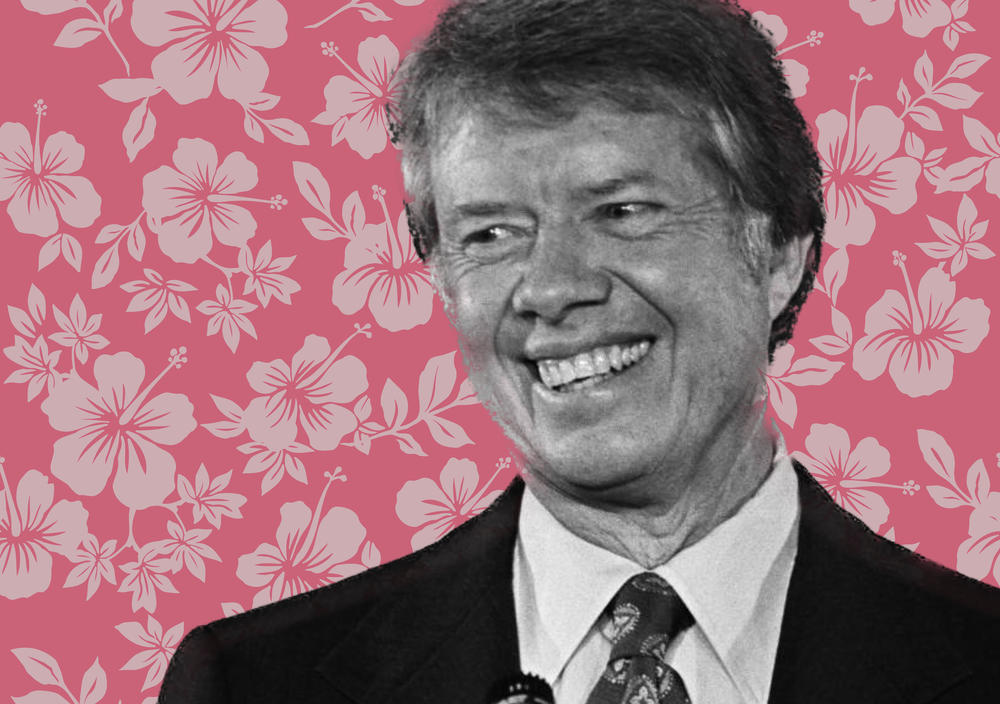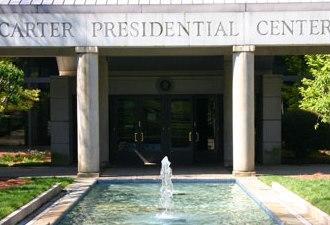
Section Branding
Header Content
Jimmy Carter: A Model Southerner
Primary Content
When President Jimmy Carter died on Sunday, Salvation South editor Chuck Reece remembered the night when he, at age fourteen, first shook the great man’s hand. Chuck has some thoughts about the examples Carter left behind for all Southerners.

Since everybody I grew up with can remember, the Ellijay, Georgia, Lions Club has put on the Gilmer County Fair every summer.
Farmers young and old compete to see whose corn, squash, okra, tomatoes, and other vegetables came out of the garden biggest and best looking. Kids get to ride the tilt-a-whirl and the ferris wheel, and slam into each other in bumper cars.
I particularly remember a certain teenage summer at that fair. I was walking across the fairgrounds to meet some friends when a casually dressed man with red hair walked up to me and said this:
My name is Jimmy Carter, and I’m running for president.
I’m sure he knew I wasn’t old enough to vote for him, but I was mighty pleased that he shook my hand, anyway. If my memory serves me right, he was wearing a Marshall Tucker Band T-shirt. That band from South Carolina was one of my favorites at the time, so I figured Mr. Carter was cool.
But I could never have guessed I had just shaken hands with one of the greatest human beings my home state would ever produce. Let’s study his life for a moment.
At age 28, Naval Ensign Carter led a team that dismantled a nuclear reactor that was melting down.
On the day he was sworn in as governor, he declared, “The time of racial discrimination is over.”
As president, he brokered the Camp David Accords, ending the war between Egypt and Israel.

After he left office, he founded the Carter Center in 1982 to defend human rights and reduce human suffering. Among its countless achievements, the Center Center led the eradication of Guinea worm disease, a parasitic infection that afflicted 3.5 million people in Africa and Asia four decades ago. In 2024, only seven cases were reported worldwide. Put another way, Jimmy Carter led an effort that reduced the incidence of that disease by 99.9998 percent.
The way Jimmy Carter lived his life—focused entirely on ensuring that all human beings had an equal chance to pursue life, liberty and happiness—was an example to the whole world. And in his speech and writing, he always reminded us that those who have much must be willing to give much. I’ve always been partial to the way he put it in 2002, when he accepted the Nobel Peace Prize:
A strong nation, like a strong person, can afford to be gentle, firm, thoughtful, and restrained. It can afford to extend a helping hand to others. It's a weak nation, like a weak person, that must behave with bluster and boasting and rashness and other signs of insecurity.
When President James Earl Carter Jr. passed away on Sunday at the age of 100, a giant walked off our Southern soil. May all of us who make this region our home remember—and try to live up to—his examples.
Come see us at SalvationSouth.com.
Salvation South editor Chuck Reece comments on Southern culture and values in a weekly segment that airs Fridays at 7:45 a.m. during Morning Edition and 4:44 p.m. during All Things Considered on GPB Radio. Salvation South Deluxe is a series of longer Salvation South episodes which tell deeper stories of the Southern experience through the unique voices that live it. You can also find them here at GPB.org/Salvation-South and wherever you get your podcasts.
When President Jimmy Carter died on Sunday, Salvation South editor Chuck Reece remembered the night when he, at age fourteen, first shook the great man’s hand. Chuck has some thoughts about the examples Carter left behind for all Southerners.






